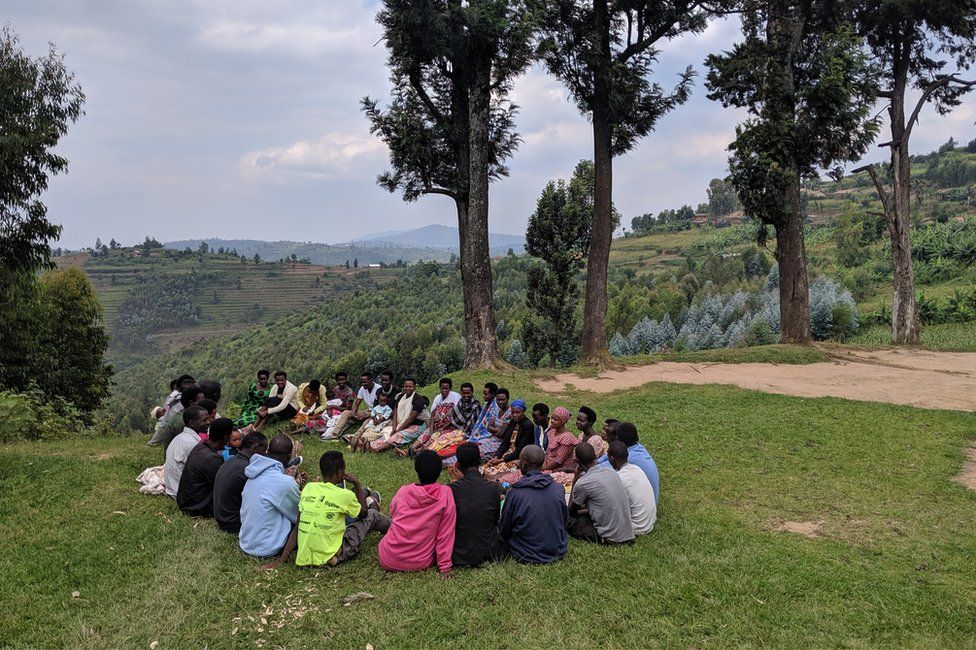
Continuing our series of articles from our Annual Report 2023/24, we outline here our work on our Young Survivors Counselling Project.
Thousands of youthful survivors of the 1994 genocide are only now confronting the horror of seeing their families murdered. They struggle to make ends meet, alone and vulnerable, prone to depression and hopelessness.
Through support from our partner Network for Africa (N4A) we are working with AERG to train counsellors who in turn train local people to become counsellors. The counsellors are themselves survivors who have endured trauma, so they are familiar with the challenges faced by people with depression and other mental health issues. The counsellors are coordinated by SURF Senior Key Worker, Emilienne Kambibi.
During 2023, 345 young survivors (132 male, 213 female) from the eastern and southern provinces were supported through 240 group counselling sessions. 142 of these also received individual counselling from SURF’s project counsellors. At the start of the year, 24 survivors were selected to become peer support counsellors (PSCs) and trained in trauma counselling, before leading the group counselling sessions. They participated in 4 clinical supervision sessions during the year.
All 345 counselling participants, and 749 community members, received psychoeducation on types of mental health issues e.g. trauma, depression, substance addiction/abuse. We also conducted 177 home visits during the year, providing family therapy, help to resolve family conflicts, and psycho-education.
Our counsellors supported the participants to prepare mentally for the 29th Commemoration of the Genocide against the Tutsi in Rwanda. This support meant that some people felt able to take part in genocide commemoration activities for the first time. During the commemoration event, the counsellors assisted 55 survivors with post-traumatic stress disorder (PTSD), of whom 11 needed to be transferred to health facilities – they have all since recovered and have been discharged.
In 2024, SURF has started 12 new peer counselling groups in the east (Rwamagana District) and south (Huye District), consisting of 300 people (110 male, 190 female). So far, the groups have had 3 or 4 sessions each, and a baseline study has been conducted with a sample of 60 participants.
K.M *
K.M is a young woman living in Gahengeri sector of Rwamagana in the Eastern province. She is married and has two children. She was born into a family of five children, including herself, where her parents were killed during the Genocide against the Tutsi in 1994. She survived with only one sister, who later passed away when K.M was 11 years old. Due to her difficulties, she was unable to complete her studies and dropped out of school in the second grade of secondary school.
At the beginning of the counselling group, K.M didn’t talk or laugh. When asked how she feels, she only cried. During individual counselling, she was able to talk about her problems. She said, “If I see happy people laughing, it makes me very sad. I feel like I don’t have any reason to be happy. When I was ready to get married, I refused to have a wedding because I have no one to share that happiness with. I sleep less often because I spend time thinking about how someone lives without having a family. I hear voices telling me that I am nothing, I easily get angry, which makes me unable to socialise with others. I have no friends, and I like being alone. I don’t see my future; I feel less important in the community. I joined the group counselling because I was told that I can be helped and at least be able to raise my children.”
K.M is being assisted in individual and group counselling sessions to awaken positive resources within herself. For instance, she is reminded that she already has a family stemming from her, and she has a husband whom she cares for. Additionally, she has been encouraged to visit the health centre to obtain medication for depression.
